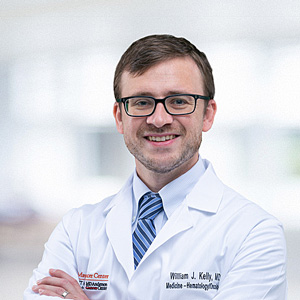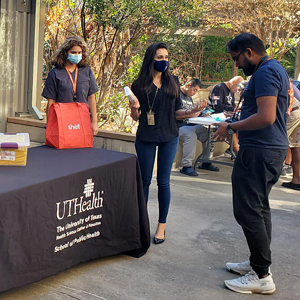
William Kelly, M.D., a medical oncologist specializing in neuro-oncology and thoracic oncology at The University of Texas Health Science Center at San Antonio, received a $1.5 million CPRIT Early Clinical Investigator grant (RP210164) in 2021. His research focuses on translating existing drugs, which have shown benefit in other types of cancer, into therapies for tumors of the central nervous system.
The CPRIT grant helps fund his investigation of Sacituzumab, a novel antibody drug conjugate successful in treating breast cancer, as a treatment for recurrent glioblastoma. Glioblastoma is the most common and unfortunately the most aggressive form of brain cancer. It has an average survival, even after surgery, radiation and chemotherapy, of only about 14 months.
Dr. Kelly uses advanced imaging and molecular testing to understand whether Sacituzumab will prolong survival for patients with glioblastoma and the mechanism by which it does so. He has recently opened a Phase II, multicenter prospective study of Sacituzumab in recurrent glioblastoma, with 18 of 40 patients enrolled and dosed as of August 30, 2023. Dr. Kelly is pursuing an M.S. in Clinical Investigation and Translational Science in the Institute for Integration of Medicine & Science at UT Health San Antonio with these funds, while also giving monthly lectures.

Located in Houston’s Texas Medical Center, the Gulf Coast Consortia (GCC) is one of the largest inter-institutional cooperatives in the world. Formed in 2001, GCC is a collaboration of basic and translational scientists, researchers, clinicians, and students in the quantitative biomedical sciences. Member institutions include Rice University, The University of Texas MD Anderson Cancer Center, The University of Texas Health Science Center at Houston, Baylor College of Medicine, Houston Methodist Research Institute, Texas A&M Institute of Biosciences and Technology, University of Houston, and The University of Texas Medical Branch in Galveston. The GCC Research Consortia supports 700 faculty members and GCC’s training arm - the Keck Center – works with more than 50 trainees and has 400 affiliated faculty members.
GCC is advancing the region’s scientific progress through participation in joint training and research programs, utilization of shared equipment and core facilities, and the exchange of scientific knowledge. It provides a unique, cutting-edge collaborative training environment and research infrastructure beyond the capability of any single institution and supports CPRIT's long-term vision to invest in the cancer research capacity of Texas institutions.
CPRIT grants fund several GCC programs and core facilities. One example is the TMCi Accelerator for Cancer Therapeutics, launched by the GCC and The University of Texas Medical Branch and funded by a $5.4 million CPRIT Core Facility Support Awards grant (RP190674) in 2019. The TMCi Accelerator for Cancer Therapeutics supports Texas-based biotech entrepreneurs and researchers interested in translating research discoveries into devices and drugs helping cancer patients. Working alongside institutional technology transfer teams, cancer researchers and early-stage companies receive business and commercialization support.
According to Suzanne Tomlinson, Ph.D., director of Research Programs and Strategic Initiatives at GCC, “CPRIT is a game changer, but it's not just the core facility support award funding that is very, very important. And it's been huge to what we do. But it's also the other grants that keep great researchers in Texas and that bring them, because all of this is about collaboration and keeping people in a general area makes it easier to collaborate.”

Texas has the highest rate of liver cancer in the U.S., and it is the fastest growing cancer in the state. Hepatitis B and C (HBV and HCV) can cause liver cancer. Vaccinating against HBV and treating HCV are proven methods for preventing liver cancer. Unfortunately, many individuals at highest risk for HBV and HCV are also the most disconnected from care. Individuals experiencing housing instability or homelessness bear a disproportionally high risk, but the transitory nature of homelessness hinders long-term engagement in care. Permanent supported housing provides an innovative setting to engage these individuals in the HBV/HCV continuum-of-care (education, testing, vaccination and treatment).
CPRIT awarded a $1.16 million Prevention grant (PP180086) to The University of Texas Health Science Center at Houston and Vanessa Schick, Ph.D., in 2018 to develop the GRASSROOTS HEALTH model in Harris County. GRASSROOTS HEALTH (Giving Residents At Supportive and Single Residency Occupancy Sites an Opportunity for Treatment & Screening for Hepatitis – Education And Linkage To Healthcare) is a theory-driven, interdisciplinary partnership model designed to bring the HBV/HCV continuum-of-care directly to residents in permanent supported housing. Based on the success of the original program, CPRIT funded a $1.96 million extension (PP220022) in 2022, to expand the services to veteran housing and low-income housing sites in Bexar, Frio, Guadalupe, and Comal Counties.
As a result of CPRIT funding, GRASSROOTS HEALTH has provided direct HBV/HCV education and screening to over 1,500 permanent supported and low-income housing residents to date. In 2023, GRASSROOTS HEALTH tested over 600 residents for HBV/HCV: vaccinating almost 60% of those eligible and navigating nearly 75% of those testing positive into care. In addition to client-level services, this project enhanced the HBV/HCV service capacity of several partnering clinics and provided HBV/HCV education through more than 60 homeless service providers, distributing over 11,000 educational materials. An initial economic evaluation suggests the GRASSROOTS HEALTH model not only saves lives but is also cost effective.